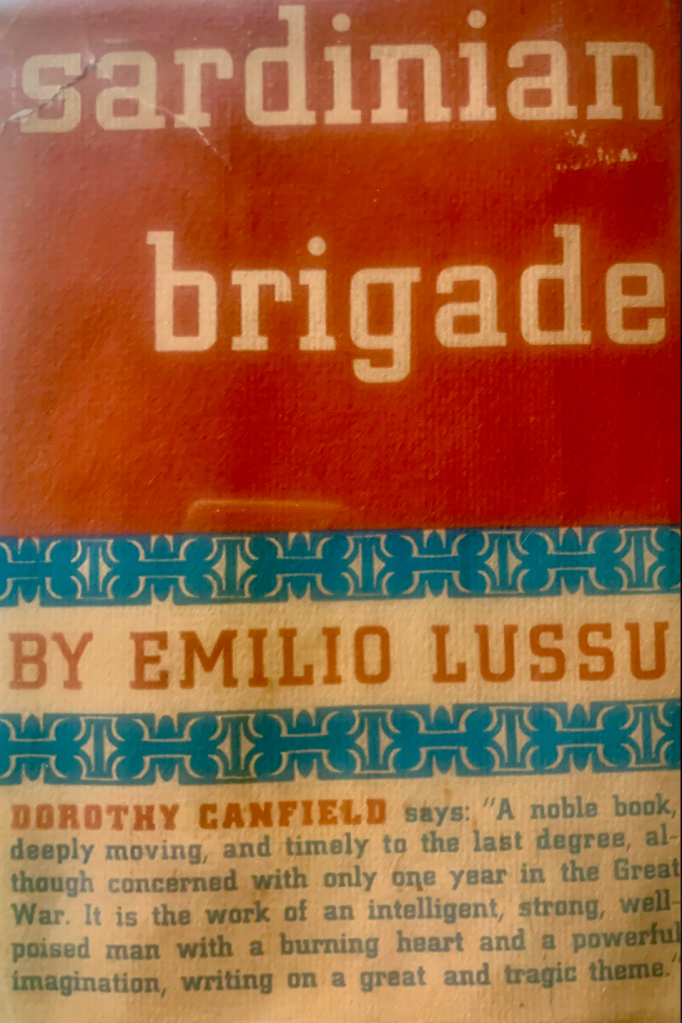Why this book: I have hiked in the Dolomites of Northern Italy and visited sites of WW1 Battles between the Italians and the Austrians, and twice visited a museum dedicated to these battles. I have also read other books on WW1 – a terrible and tragic war.. This book was recommended as an engaging first person look at that war. I read an old first edition version I got on Abebooks, but it has been republished and is currently available as A Soldier on the Southern Front
Summary in 3 Sentences: A first person account by a junior officer in the Italian Army of one year during World War 1 fighting the Austro-Hungarian forces for control of Northern Italy. The author was not a career army man, and viewed with dispassion and some alarm at the decisions made by senior officers. He wrote this book some 20 years after WW1 about his experiences fighting on the front under his Italian generals against a very different foe.
My Impressions: The cover of the edition I have was written by a reviewer in the late 30s, and I believe describes this book pretty well: “ It is the work of an intelligent, strong, well poised man with a burning heart and a powerful imagination, writing on a great and tragic theme.” This book describes only one year of the four he spent in the Italian Army during The Great War.
The author is an intelligent and well educated junior officer who had grown up in Sardinia and had just graduated from the university Padua in law. He had joined Italy’s army to defend his country against the Austrian forces that had invaded Northern Italy as part of the German and Austro-Hungarian axis fighting the Allies. He did not have strong Marshall impulses but did have a strong sense of duty to his responsibilities as an officer in the army and to his country, but also a strong sense of compassion. During the year of war he describes in this book, these two sentiments were often in conflict.
He says in his preface that he simply describes some of the incidents that made the greatest impression on him that he recalls from that one year – and he published this book 20 years after they had taken place.
When I described this book to friends, I noted that the insane leadership and decisions that he described reminded me of Catch 22 and the author is an Italian Yossarian but one who is committed to his duty – but has retained enough common sense and humanity to see the sheer bald stupidity of orders that he observed – and even had to carry out, more often than not, with tragic consequences – resulting in pointless loss of life.
At that time and in that war, brandy was issued to all officers and seen as nearly indispensable to help soldiers and officers deal with fear and overcome inhibitions. He describes several officers who, when the going got tough, retreated to the bottle and were drunk – sometimes sitting out the battle alone in a room drinking. In one case a Major dealt with his stress by getting roaring drunk and enraged at some of his men who refused to carry out a foolish order, and then ordered them to be executed. When the other troops refused, he pulled out his pistol and started shooting them himself, until the other troops shot and filled him with bullets, their battalion commander.
He movingly described how he and one of his men snuck up very close to an Austrian position where they could easily at close range shoot and kill an Austrian soldier making his coffee. Neither he nor his soldier could shoot an unarmed soldier, who was not engaged in combat, unawares in the process of daily non-combat activities. This is an ethical/psychological challenge has often been discussed in journals of military ethics.
The disillusion of the junior officers and troops with the leadership of the Italian Army at the time was a constant theme. The author saw and argued against decisions that were clearly foolish, futile and would clearly have disastrous consequences, but he felt bound by his duty and oath as an officer to obey orders – even stupid ones. He described several mutinies against the leadership.
It was clear that the career senior officers had been brought up with a romantic and heroic ideal of warfare and sought to impose that on their men – who they demanded behave in accordance with outmoded heroic visions of warfare – men blindly sacrificing their lives to fulfill the ideals of their bold leaders. The author’s common sense, practical and humane view of warfare was in direct contrast to that view held by so many of his leaders.
This book describes the transition between 19th and 20th century warfare that was so tragic in WWI. Another book – a novel – which describes this tragic transition is CS Forrester’s The General.
This is a short and well written and engaging first person look at the WWI trench warfare, and artillery battles in Northern Italy – a somewhat different version, but sill similar to better known battles on the Western Front, described by Remarque in All Quiet on the Western Front, and Robert Graves in Goodbye to All That.

